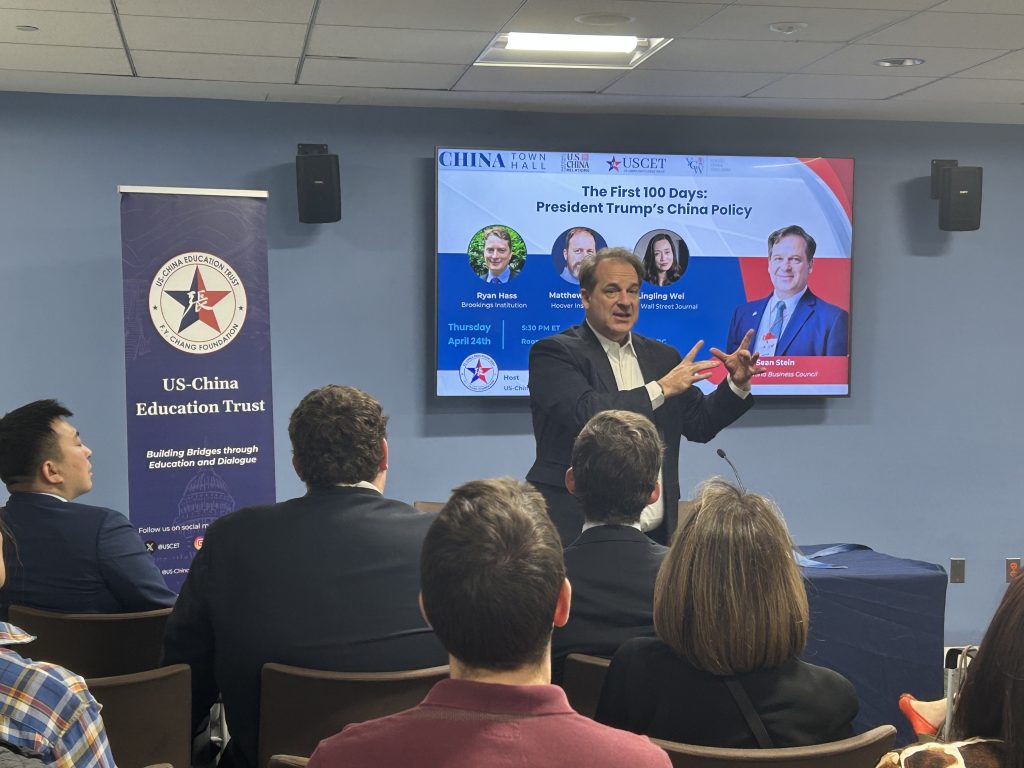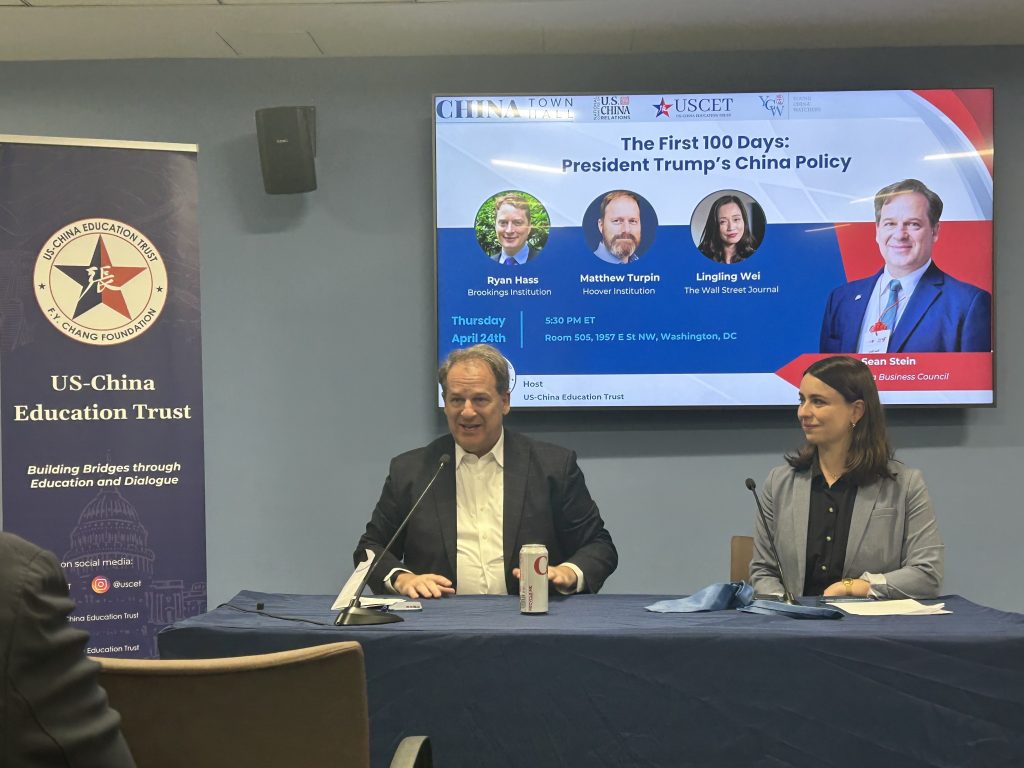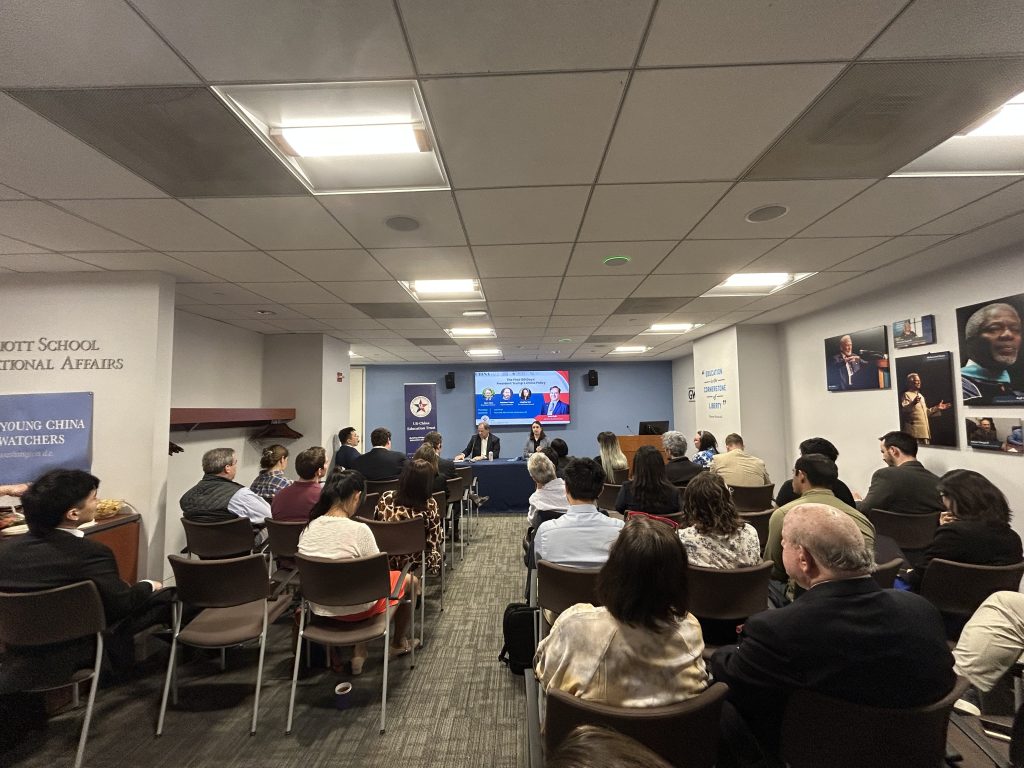On April 24, USCET co-hosted the National Committee on U.S.-China Relations’ annual CHINA Town Hall, in collaboration with Young China Watchers (YCW) in Washington, D.C. This year’s discussion focused on President Trump’s China policy during the first 100 days of his new administration.
Our local discussion featured Sean Stein, President of the US-China Business Council and former U.S. Consul General in Shenyang and Shanghai, who shared remarks on the historical and current dynamics of U.S.-China relations, as well as the implications of President Trump’s policies.

Opening remarks were delivered by Rosie Levine, USCET’s Executive Director, and Ann Listerud, who represented Young China Watchers’ DC Chapter. Sean Stein then set the stage by presenting a compelling historical overview of U.S.-China policy, illustrating shifts from the Obama administration’s “carrot” diplomacy, to the “stick” tactics under Trump’s first term, to the competitive framework adopted by the Biden administration, and finally to Trump’s second-term policies, signaling an even stricter stance marked by intensified tariffs.
Moderated by Rosie Levine, the conversation turned to the rising economic tensions between the United States and China. Stein explained that while the U.S. viewed tariffs as a strategic tool to bring China to the negotiation table and encourage investment in the U.S., China saw them as part of a broader strategy aimed at containing its rise. This miscalculation underestimated the preparations China has made to insulate its economy from U.S. pressure and its diplomatic principle of not yielding to coercion. Rather than achieving U.S. objectives, the tariffs led to significant economic escalation and an increasingly tense trade war. Stein suggested that this outcome was avoidable and was ultimately rooted in a fundamental lack of understanding of each other’s intentions.

Addressing this lack of understanding, Stein spoke about the pressing shortage of China experts in the U.S., which will continue to hinder the U.S.’s ability to engage effectively with China. He encouraged students and young professionals to pursue careers in China studies, stressing the need for a new generation capable of interpreting China and navigating the complexities of the U.S.-China relationship. He concluded by thanking USCET and Ambassador Julia Chang Bloch for the ongoing efforts to cultivate future U.S.-China specialists.
During the lively Q&A session, audience members raised questions on a wide range of topics, including the ongoing trade war, heightened scrutiny of foreign investment, Asian regional security questions, including Taiwan and the South China Sea, and the impact of State Department restructuring. Stein explained how high tariffs are driving U.S. companies to shift operations. He also noted that there is rising doubt among US allies and partners in Asia about US security commitments in the region (which plays into China’s rhetoric that the United States is an unreliable partner). He also expressed concern that the State Department’s restructuring could further reduce funding for China expertise training, underscoring the urgent need to cultivate the next generation of China specialists.

Following our local session, participants tuned into the nationwide CHINA Town Hall livestream. Ryan Hass, Matthew Turpin, and Lingling Wei provided in-depth analyses of tariffs, the Taiwan issue, strategic competition, and educational exchanges. Notably, Ryan Hass emphasized the crucial role foreign students play in strengthening U.S. higher education and global leadership. Together, they provided diverse perspectives on President Trump’s approach to China and its potential long-term impact on bilateral relations.
This year’s CHINA Town Hall – The First 100 Days: President Trump’s China Policy brought an important political discussion to the Washington, D.C. community. We are also pleased that leading media outlets, such as the South China Morning Post, covered the event.
Speaker Biography
Speaker

Sean Stein is the president of the US-China Business Council and chair emeritus of the American Chamber of Commerce in Shanghai. Previously, he co-chaired the China Public Policy Practice at Covington & Burling, advising international businesses on political risk, public affairs, and U.S.-China relations.
A former U.S. diplomat for nearly three decades, he served as consul general in Shanghai and Shenyang, with additional roles at the State Department’s China desk and across the Indo-Pacific. Sean speaks Mandarin and Indonesian and is a graduate of Georgetown University.
About the Series: CHINA Town Hall
The CHINA Town Hall, organized by the National Committee on U.S.-China Relations (NCUSCR), is a nationwide program that offers a comprehensive overview of the current U.S.-China relationship and its local impact—shaping discussions in communities across the country. By connecting local audiences with U.S. policymakers and leading experts on China, the program fosters informed dialogue on this vital bilateral relationship.
